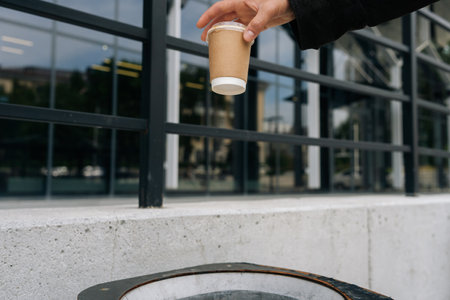1. Introduction: The Rise of Curbside Composting in America
Across the United States, cities are reimagining their approach to waste management by rolling out curbside composting programs that make it easier than ever for residents to reduce landfill waste right from their own homes. This movement isn’t just about disposing of food scraps or coffee grounds—it’s about empowering communities to take everyday actions that support a more sustainable future. As urban areas grapple with overflowing landfills and increasing environmental concerns, curbside composting emerges as an accessible and practical solution that invites participation from households of all sizes. By exploring what different cities are doing to encourage these eco-friendly habits, we can see how collective efforts—like separating organic waste for compost instead of trash—are making a real difference for neighborhoods across the country. From small towns in Vermont to bustling metros like San Francisco, Americans are embracing new routines that turn kitchen leftovers into valuable resources, fostering a culture where sustainability is woven into the fabric of daily life.
2. Coffee Waste: An Overlooked Resource
Every morning, millions of Americans start their day with a fresh cup of coffee. But have you ever wondered what happens to all those used coffee grounds once the last sip is gone? Surprisingly, coffee waste is a significant yet often overlooked component of urban food waste. When tossed into regular trash, these grounds end up in landfills, where they release methane—a potent greenhouse gas—as they decompose. This environmental impact has inspired U.S. cities and local cafes to rethink how they handle coffee waste, turning a daily habit into an opportunity for sustainability.
The Environmental Impact of Coffee Grounds
Unlike some organic materials that break down harmlessly, coffee grounds are rich in nitrogen, making them valuable for composting—but problematic when left in landfills. The decomposition process in oxygen-starved landfill conditions leads to methane emissions, contributing to climate change. By recognizing the scale of this issue, both city governments and business owners are stepping up with creative solutions.
How Cities and Cafes Are Innovating
Across the U.S., cities like San Francisco, Seattle, and New York are partnering with local cafes and composting programs to keep coffee waste out of landfills. Some offer special curbside compost bins specifically for businesses that generate large amounts of organic waste. Others encourage residents to drop off coffee grounds at farmers’ markets or community gardens, where they are turned into nutrient-rich soil amendments.
Examples of Coffee Waste Initiatives
| City | Program/Initiative | Impact |
|---|---|---|
| San Francisco | Curbside composting includes coffee shops; city provides training on separating grounds. | Diverted thousands of tons from landfill annually; boosts community garden soil quality. |
| Seattle | “Grounds for Your Garden” partnership between Starbucks and local gardeners. | Residents collect free used grounds for home composting or gardening. |
| New York City | Pilot programs connecting independent cafes with municipal compost pick-up services. | Expands access to composting for small businesses; raises public awareness. |
The Path Forward: Community Engagement Matters
The journey toward more sustainable coffee habits is just beginning. By viewing coffee waste as a resource rather than refuse, American cities are cultivating a culture of reuse and environmental stewardship—one cup at a time. Whether you’re a cafe owner or simply someone who loves their morning brew, your participation can make a meaningful difference in transforming coffee waste from an overlooked problem into a solution for greener communities.
![]()
3. How U.S. Cities Are Making Composting Easy
Across the United States, local governments are stepping up to make composting accessible and convenient for everyone. Free curbside pickup programs are one of the most effective ways cities encourage sustainable habits among residents. By offering weekly or bi-weekly organic waste collection right at people’s doorsteps, cities like Seattle and San Francisco remove barriers to participation, making it simple for even the busiest households to get involved.
Educational Campaigns: Changing Mindsets
Many municipalities realize that providing services is just the beginning—they also need to nurture a culture of sustainability. That’s why cities such as Portland, Oregon and Austin, Texas run robust educational campaigns. Through workshops, school partnerships, local events, and social media outreach, these cities help residents understand what can and cannot be composted. They also share the environmental benefits of diverting food scraps and coffee grounds from landfills, gently guiding communities toward lasting change.
The Power of Free Compost Bins
To make composting even easier, some cities distribute free or subsidized compost bins. For example, New York City’s Department of Sanitation hands out kitchen caddies and backyard bins during special sustainability events. This practical approach lowers the entry barrier for families who may not have considered composting before—and often sparks meaningful conversations about daily habits at home.
Local Partnerships Make a Difference
Collaboration is key. Cities frequently team up with neighborhood organizations, coffee shops, and schools to create targeted initiatives—like dedicated drop-off spots for used coffee grounds or community-run compost hubs. These partnerships ensure that resources reach every corner of the city and foster a shared sense of responsibility for keeping neighborhoods green.
Together, these practical steps prove that when cities invest in convenience and education, they inspire more residents to join the movement toward a cleaner, more sustainable future—one compost bin at a time.
4. Partnerships with Local Cafés and Businesses
Building a sustainable future isn’t just about city policies—it’s also about nurturing grassroots collaborations right in our neighborhoods. Across the United States, municipalities are teaming up with local coffee shops and small businesses to tackle the challenge of coffee waste and promote curbside composting. These partnerships create a ripple effect, making sustainability accessible and even enjoyable for residents who frequent these beloved community spaces.
How Collaborations Work
Coffee shops generate a significant amount of organic waste, from used coffee grounds to biodegradable cups and food scraps. Instead of sending this material to landfills, many cafés have begun working with city-run or third-party composting programs. Here’s how the process typically unfolds:
| Step | Description |
|---|---|
| Collection | Cafés collect used coffee grounds and other compostable items in designated bins. |
| Pickup | The city or a composting partner picks up the waste on a regular schedule—sometimes daily, sometimes weekly. |
| Composting | The collected materials are processed at local facilities, turning waste into nutrient-rich compost for parks, gardens, and farms. |
| Community Engagement | Cafés educate customers through signage, workshops, or incentives for participating in compost-friendly habits. |
Success Stories from American Cities
Cities like Seattle, San Francisco, and Austin stand out for their innovative approaches:
- Seattle: The city works with independent coffee shops to offer discounted compostable products and provides resources for staff training.
- San Francisco: Local roasters participate in “Grounds for Gardens,” where customers can take home free bags of used grounds for their plants.
- Austin: City grants help small businesses offset the costs of commercial compost pickup services.
The Neighborhood Impact
These partnerships foster a culture of sustainability that extends beyond business walls. By making composting visible and accessible where people gather every day, cities help normalize eco-friendly habits. Regulars at their favorite café see firsthand how simple changes—like tossing a cup in the right bin—can add up to meaningful environmental impact.
5. From Compost to Community: Empowering Residents
Across the United States, curbside composting is becoming more than just a green bin at the end of your driveway—it’s a movement that brings neighbors together and builds stronger communities. Families in Portland, Oregon, proudly share stories about their “compost parties,” where kids learn how banana peels and coffee grounds transform into rich soil for community gardens. In Austin, Texas, neighborhood compost challenges encourage friendly competition, with local cafes offering free refills to those who bring in spent coffee grounds for collection. These city-led initiatives tap into American values of teamwork and creativity, making composting accessible—and genuinely fun—for everyone.
Many cities are going beyond simple pick-up services by introducing educational workshops, gamified apps, and reward programs. For example, San Francisco residents can track their household’s compost contributions through a mobile app and earn points toward discounts at local businesses. Meanwhile, Minneapolis hosts “Compost Fests” each spring, where residents swap stories, share home-grown veggies, and win prizes for the most innovative upcycling of food scraps—turning sustainability into a celebration rather than a chore.
This sense of empowerment doesn’t stop at individual homes. Apartment dwellers in New York City participate in building-wide composting contests, while some Seattle neighborhoods have created community drop-off hubs near parks and coffee shops. These creative solutions make it easy for people of all ages and living situations to get involved. Ultimately, when cities nurture these local connections and celebrate small wins together, they create lasting change—proving that every eggshell and coffee filter tossed into the compost can help grow not only healthier soil but also a more vibrant, united community.
6. Looking Ahead: The Future of Urban Composting
As more U.S. cities embrace curbside composting and creative solutions for coffee waste, the future looks promising for urban sustainability.
Upcoming Policies on the Horizon
Several states and municipalities are gearing up to introduce stricter organics recycling mandates and incentives. For example, New York City’s organics collection is expanding citywide, while California continues to lead with legislation requiring businesses and households to separate food scraps. These policies not only set ambitious diversion goals but also provide funding for public education and infrastructure upgrades.
Tech Innovations Powering Change
Technology is playing an increasingly important role in making composting more accessible and effective. Smart bins equipped with sensors can track contamination rates and provide real-time feedback to residents. App-based platforms now connect coffee shops directly with local gardeners or community composters, ensuring that spent grounds find a new purpose instead of heading to the landfill. Even waste haulers are integrating route-optimization software to reduce emissions during collection.
Trends Shaping the Next Decade
Looking ahead, we’re likely to see a greater emphasis on closed-loop systems—where coffee shops, offices, and restaurants partner with city programs or local farms to turn organic waste into valuable compost that nourishes urban gardens and green spaces. There’s also growing interest in “hyper-local” composting hubs, where neighbors collaborate at the block level, fostering both community ties and environmental stewardship.
The Role of Education and Community Engagement
Education remains key to success. Cities are launching campaigns centered around storytelling, highlighting how composting transforms everyday habits into collective impact. Workshops at libraries, pop-up events at farmers markets, and partnerships with baristas are all helping demystify the process—and make it feel approachable for everyone.
A Greener Urban Future
With policy momentum, tech solutions, and a groundswell of grassroots enthusiasm, American cities are poised to make composting a natural part of urban life—turning yesterday’s coffee break into tomorrow’s healthy soil. As more people join in, these sustainable habits have the power to reshape neighborhoods, reduce landfill waste, and create greener communities for generations to come.

